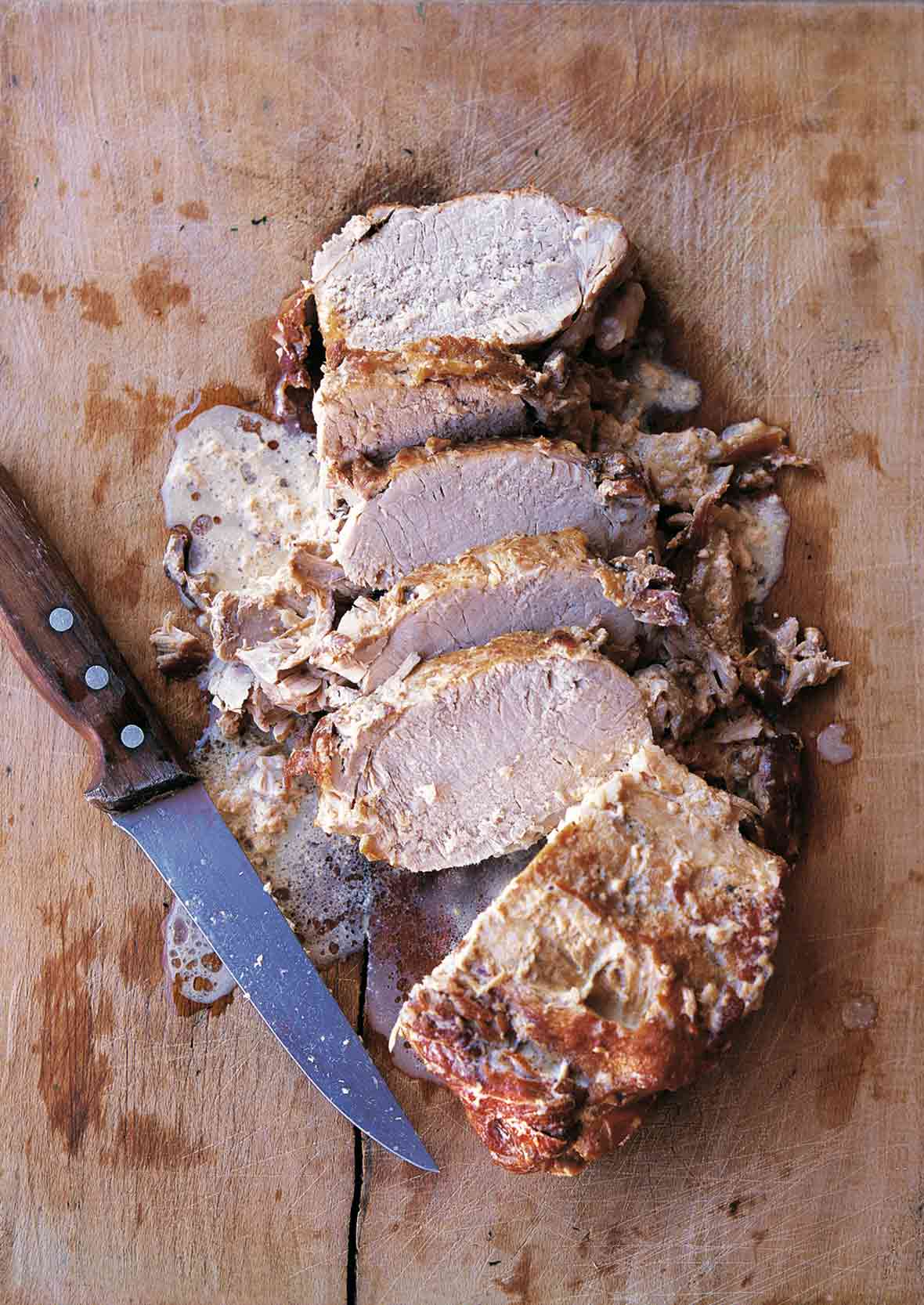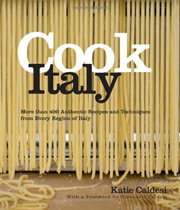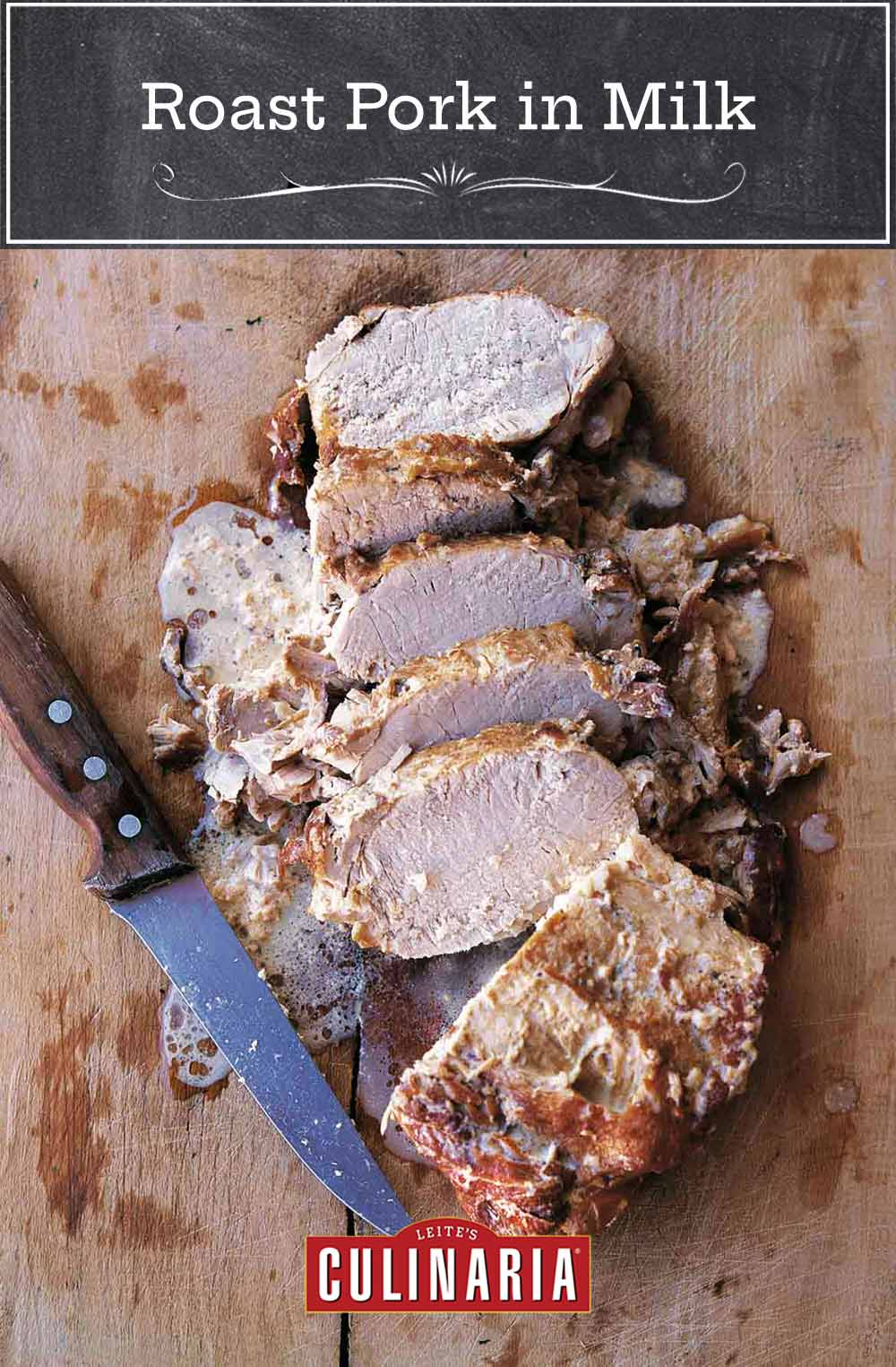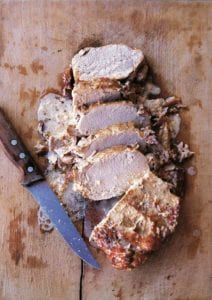
Want to save this?
A stroke of Italian brilliance, this classic tenderizing technique infuses a relatively cheap cut of pork with the subtle sweetness of milk. Thing is, pork loin nowadays is leaner than it once was back in the day. Those who like their pork falling-apart tender and infused with fatty flavor ought to consider swapping the loin for a fattier cut of pork, perhaps something from the shoulder region such as pork butt. (We love saying those words almost as much as we love devouring the tantalizingly tender meat.) Promise you won’t be disappointed.–Katie Caldesi
Roast Pork in Milk
Ingredients
- 3 1/2 pound pork loin
- 4 tablespoons butter
- Salt
- 3 tablespoons olive oil
- 3 cups whole milk
Instructions
- Remove the rind from the loin of pork for a leaner roast or leave it on and score with a sharp knife for a crusty-topped roast with crackling fat that imbues the pork with flavor.
- Cut as close to the ribs as possible to partially separate the meat from the bones but leave a “hinge” of meat in place to keep it together to make it simpler to cut through after roasting.
- Heat the butter and oil over medium heat in a large, heavy-bottomed saucepan or flameproof casserole. Season the outside of the pork with salt—but go easy. Lower the pork into the pan and sear until the skin is crisp and a rich golden color, turning it every few minutes. It will take about 15 minutes to ensure all the edges are golden.
- Reduce the heat slightly and add the milk to the pan or casserole very, very slowly so it doesn’t bubble up too much. Gradually bring it to a gentle simmer and partially cover the pan. Let the pork cook like this for 2 hours, or until the juices run clear when pierced with a skewer. The pork will be tender but not fall-apart tender and the milk will turn yogurt-like and clumpy and may brown somewhat.
☞ TESTER TIP: The milk sauce won't look pretty. But just wait until you taste it.
- Transfer the pork to a cutting board and let it rest for 5 minutes, loosely covered with foil. Leave the pan with the cooking liquid on the stovetop. Skim most of the fat from the surface of the juices and discard, then whisk the remaining cooking liquid to break up the chunks of coagulated milk a little. It won't be pretty, but that's okay.
- Carve the meat and place the pork slices on a warm plate. Pour the pan sauce over the pork and serve. (If you find upon slicing the pork that you’ve undercooked it, slip the pork slices and sauce in an oven cranked to 350°F (176°C) and bake for 5 to 10 minutes, or until cooked through.)

Explore More with AI
Nutrition
Nutrition information is automatically calculated, so should only be used as an approximation.
Recipe Testers’ Reviews
Did you know only 68% of the recipes we test make it onto the site? This recipe survived our rigorous blind testing process by multiple home cooks. It earned the Leite’s Culinaria stamp of approval—and the testers’ reviews below prove it.
From a taste perspective, the sauce is knock-it-out-of-the-park delicious, a combination of sweet, caramelized sugar from the milk and a meaty saltiness from the pork. It is perfect. As for the meat itself, I found that I enjoyed the very ends of the roast best, as they were the most marbled with fat that melted beautifully and melded with the sauce.
Before I get too far along, let me just say that the star of this dish is the sauce, hands down. That said, it’s a sauce with a face only a mother could love, which is a shame. Given its rather regurgitated look, it was passed on by all the kids, but there was a silver lining to be found—more sauce for ME. Even blasting the sauce briefly with a stick blender at service doesn’t help much. It’s just plain hard to make chunks of curdled milk look good.
The closer we got to the center of the roast, the firmer and less flavorful the meat was. That’s not to say that the meat was dry inside, because it wasn’t, but the fattier end pieces were much more satisfying. That said, I think the next time I make this, I’ll use a different cut of meat, perhaps from the shoulder, such as a picnic roast or Boston butt. It will no doubt require a tad more defatting of the sauce at the end, but should result in a fall-apart-tender roast.
A final note: while not asked to in the recipe, I rolled the roast in the milk every half hour or so to keep it from sticking to the bottom of the pan, as well as to ensure that ALL of the meat had equal time submerged in the reducing sauce. I would recommend you do the same.
This maiale al latte was wonderful, delicious, and so surprising. This is absolutely not what I expected from braising pork in milk, nor did I expect the milk to transform into such a rich, beautiful sauce. The pork was tender, but not falling off the bone, unlike other cuts that contain more gelatin or connective tissue. What you do get is a perfectly toothsome bite of meat that is moist and flavorful, just how loin should be cooked.
Rather than whisk the sauce to incorporate the milk solids, I sieved the solids out and separated the fat into a beautifully classical demi-glace. Serve this pork and its sauce with creamy polenta. Yum!
Prior to telling what we all thought of this recipe, I must share my mother-in-law’s perplexed and worried look when I started testing it. She bought a beautiful pork loin roast and as I was getting ready to start preparing it, she pulled out the oven pan for it. I went on to explain this was to be done on top of the stove. The look on her face was priceless, and she was pretty nervous about this dish’s outcome.
Needless to say, once it was cooked, she was in awe as her husband and sons were picking the meat around the bones. Indeed, its outcome was a fantastic, juicy, and tender roast filled with taste, and the milky sauce that accompanied it could not have been better. Both my husband and I also loved it, but right away started to think of other ways to redo it even more to our taste. We thought of adding a nice strong mustard next time. We shall see!
I hadn’t made maiale al latte for quite some time, so I was excited when this recipe appeared. This dish could hardly be simpler—sear, add milk, and braise. What I enjoyed about this recipe is that the pork flavor was pronounced, as pork tends to be neutral in taste. But this method makes you feel like you really are eating pork! The recipe said to cook the pork at a low simmer for 2 hours, or until juices run clear. Well, my preference is to cook pork to slightly blush pink, and this took nearly 45 minutes longer.
Before that, the juices were still dark pink to red. Thankfully I started the recipe early! The meat was moist (definitely not even close to falling apart, but I think that is the nature of pork loin) and certainly did need to be seasoned with salt and pepper after cooking. I found that simply whisking the milk curds was not enough, so I pulverized in a blender instead for a smooth (albeit very runny) sauce. For leftovers tomorrow, I will thicken the sauce slightly with arrowroot or cornstarch. The flavor of the sauce was simple yet lovely served with garlic mashed potatoes. The bonus was the cracklings, which I sort of saved for myself (I opted to leave the rind on).
All in all, I would make this again doing the same as I did this time—cook longer for perfect blush pink interior, blitz the sauce in a blender and season after (which one does normally anyway). Minor changes. A spoon of tart jelly or cranberries would be a nice accompaniment—so would fresh thyme thrown in for the last half hour or so of cooking.















How would this recipe work using half almond milk and half heavy cream? Or could I use half and half?
Carole, milk has a special ability to tenderize meat. You won’t find that to the same degree in half-and-half and certainly not in almond milk.